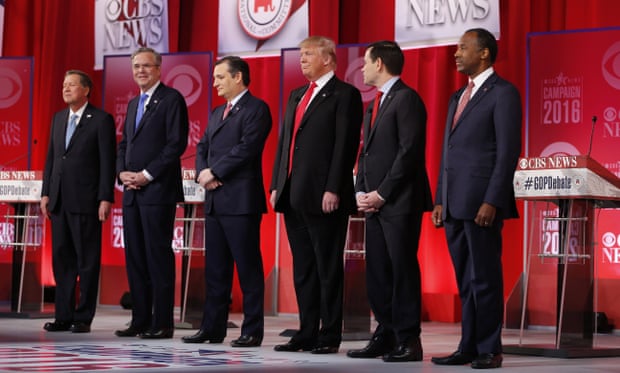- Joined
- Dec 6, 2010
- Messages
- 33,562
- Reaction score
- 5,933
Everything you need to know about the 9th Republican presidential debate
By Noah Weiland - February 11, 2016
By Noah Weiland - February 11, 2016

When is the 9th Republican presidential debate?
The 9th Republican presidential debate is Saturday in Greenville, South Carolina, a state that promises an unpleasant race to the finish line. There was a GOP debate in Charleston just last month. CBS News hosts this meeting; it ran a Democratic debate in Iowa in November.
The event is at the Peace Center, an ornate performing arts venue that hosted a 2011 GOP presidential debate. It used to be the site of a bustling wagon and carriage factory before turning into the first production factory for Duke’s Mayonnaise in 1925.
The event is at the Peace Center, an ornate performing arts venue that hosted a 2011 GOP presidential debate. It used to be the site of a bustling wagon and carriage factory before turning into the first production factory for Duke’s Mayonnaise in 1925.
The debate begins at 9 PM EST and will last 90 minutes. Over that stretch, the latest horse-race beefs and disputes will on display, as will a host of political issues relevant to South Carolina’s brand of Republicanism: military spending (there are 58,000 military retirees in the state), Evangelical Christianity and national security. (To demonstrate the latter’s urgency, Ted Cruz and Marco Rubio were in Washington Wednesday to vote on legislation that increases sanctions on North Korea.)
The debate will be broadcast on CBS and streamed online at CBSNews.com.
John Dickerson, anchor of CBS News’ “Face the Nation” and political columnist columnist for Slate, will be the primary moderator. CBS News White House correspondent Major Garrett and the Wall Street Journal’s Kimberley Strassel will contribute questions. Dickerson moderated the CBS News Iowa debate and has been interviewing the Republican candidates regularly on his weekly show. Strassel wrote a column in the WSJ in November critical of Cruz’s foreign policy qualifications.
CBS has yet to release the field, but the six remaining candidates are all expected to make it in: Cruz, Rubio, Donald Trump, Ben Carson, Jeb Bush, and John Kasich.
Candidates had to place in the top five in New Hampshire, in the top three in Iowa, or in the top five in an average of South Carolina and national polling. With the field winnowed, the criteria are less discriminating; Carson is the only remaining major candidate who could conceivably fail to qualify.
Rubio now has to fend off Trump and Bush after failing to consolidate any “establishment” consensus in New Hampshire. An unusually contrite Rubio sees the state as a chance to retrieve the energy he had coming out of a strong showing in the Iowa caucuses. He has long seen South Carolina as a place to help him solidify the nomination. Bush, whose long-awaited comeback could materialize with a strong showing in the primary, has received a boost from his brother George, who recorded a radio ad to be played in the state and is making his first appearance on the trail Monday. But perhaps most significantly, Donald Trump won a primary.
It won’t win the primary for anyone, but for several candidates, a poor finish in South Carolina could mean the end. Bush and Carson need to prove themselves after lagging in the first two contests.
And for Republicans who self-identify as “establishment,” the primary could only worsen anxieties over Trump and Cruz. It could also further expose a protracted race ahead. A few lower-polling candidates could end up dropping out after the primary if funding is low, but the voting is unlikely to offer much separation between the frontrunners. It could take until the Super Tuesday primaries before we have a sense of who’s truly in good shape heading down the home stretch.
And for Republicans who self-identify as “establishment,” the primary could only worsen anxieties over Trump and Cruz. It could also further expose a protracted race ahead. A few lower-polling candidates could end up dropping out after the primary if funding is low, but the voting is unlikely to offer much separation between the frontrunners. It could take until the Super Tuesday primaries before we have a sense of who’s truly in good shape heading down the home stretch.
Duke’s is an American favorite that first caught on in town during World War I. Eugenia Duke’s yolk-centric mayo recipe was born in Greenville just a few years after the condiment first became commercially available in the United States, and it has since ingratiated itself with burger snobs who feel it’s superior to the more popular Hellmans.
http://www.politico.com/story/2016/02/next-republican-debate-south-carolina-219153#ixzz3zwm08jnR
Last edited:



